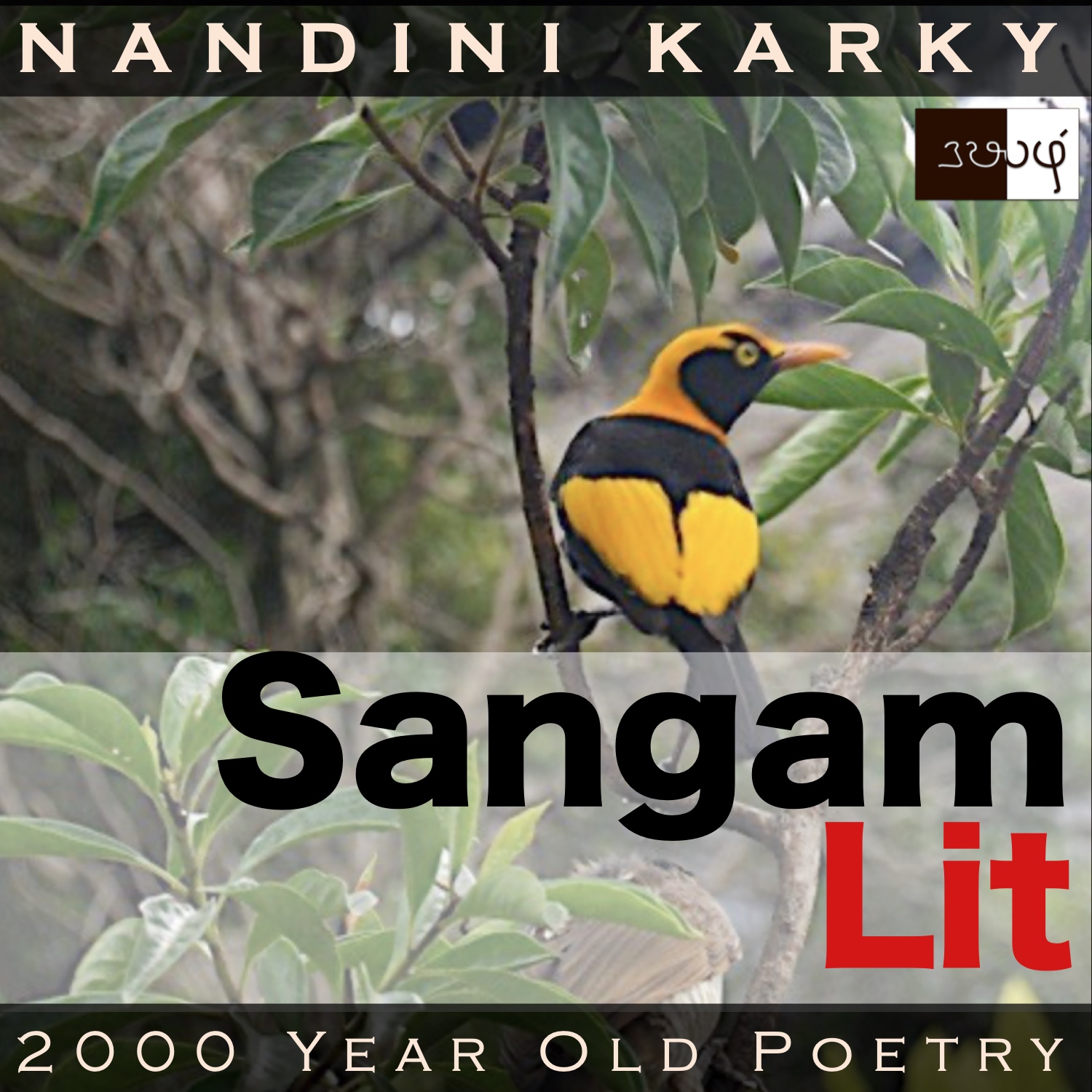Podcast: Play in new window | Download
Subscribe: Apple Podcasts | Spotify | Amazon Music | Android | iHeartRadio | TuneIn | RSS | More

In this episode, we perceive the atmosphere of an ancient village at dusk and the mood this evokes within, as portrayed in Sangam Literary work, Natrinai 218, penned by Kidangil Kaavithi Keerankannanaar. Set in the coastal landscape of ‘Neythal’, the verse speaks in the voice of the lady to the confidante, rejecting the confidante’s words of consolation and expressing the angst in her heart, as the man delays seeking her hand in marriage.
ஞாயிறு ஞான்று கதிர் மழுங்கின்றே;
எல்லியும், பூ வீ கொடியின் புலம்பு அடைந்தன்றே;
வாவலும் வயின்தொறும் பறக்கும்; சேவலும்
நகை வாய்க் கொளீஇ நகுதொறும் விளிக்கும்;
ஆயாக் காதலொடு அதர்ப் படத் தெளித்தோர்
கூறிய பருவம் கழிந்தன்று; பாரிய
பராரை வேம்பின் படு சினை இருந்த
குராஅற் கூகையும் இராஅ இசைக்கும்;
ஆனா நோய் அட வருந்தி, இன்னும்
தமியேன் கேட்குவென் கொல்லோ,
பரியரைப் பெண்ணை அன்றிற் குரலே?
The verse opens in the hues of dusk in ‘ஞாயிறு ஞான்று’ meaning ‘the sun sets’. The phrase ‘பூ வீ கொடியின் புலம்பு’ captures the ‘loneliness of a creeper that has lost its flowers’. An exquisite image that seems to infuse a nuanced emotion within what we may dismiss as a mere twig! There’s ‘வாவல்’, a ‘bat’ and the rhyming ‘சேவல்’, a male bird, making an appearance in the verse. ‘பராரை வேம்பு’ talks about the ‘large trunk of the neem tree’ and ‘குராஅற் கூகை’ about the ‘Indian eagle-owl’ called as ‘கோட்டான்’ in contemporary Tamil. The verse concludes with another bird on another tree in ‘பரியரைப் பெண்ணை அன்றிற் குரலே’ meaning ‘the voice of the red-naped ibis on the palmyra tree’. Let’s listen closely to what these birds have to say!
The man and lady had been in a love relationship for a while. The lady sees the man showing no initiative towards seeking her hand in marriage. She suffers in angst whenever he parts away even for a day. One evening, the lady’s confidante tries to console her and requests that she bear the man’s absence a little longer. To these words of the confidante, the lady says, “Down goes the sun, its light fading; The night, filled with loneliness, appears like a creeper bereft of its flowers; Bats are flying about everywhere; The male bird, filled with joy, sends out its call incessantly; The lord, who gave me clarity and set me on the right path with his undying love, had marked a time for his return; The time too has passed us by; On the leafless long branch of the neem tree with a thick trunk, a tawny owl screeches all through the night. At this time, when the unbearable illness of pining attacks me and makes me suffer, how can I bear to be alone and listen to the voice of the ‘andril’ on the rough-trunked palmyra tree?” With these words, the lady refuses to accept the confidante’s consolation and gives expression to her own suffering that is accentuated by the sounds of life around her.
Now, for a detailed exploration! The lady talks about how the sun is on its way to bed and the night seems to be suffering in loneliness akin to a creeper that has lost all its flowers. Then, she turns her attention to the creatures flying in the sky and everywhere she turns around, bats are fluttering about. Just then, her ears are filled with the sounds of male birds sending out bird calls, filled with joy and desire. As she listens to these bird songs, she is reminded about the words of her man, who pledged his undying love and promised to be back before a particular time. She tells us that time has now gone by. At this moment, she hears the deep call of the tawny owl perched on the neem tree. She shudders in pain and turns to her friend and remarks that as if all these sounds and sights were not enough, how could she bear to further listen to the call of the ibis from its roost on the palm tree! The ‘andril’ or the red-naped ibis is a special bird in Sangam literature, whom the ancients considered to be the symbol of fidelity and thought that this bird wilted and died if its mate went missing. This belief explains why the lady expresses her desperation as the strains of the ibis’ song fills the air!
Beyond the poetic expression of inner angst in the verse, the thing that caught my attention was the acute power of observation illustrated herein. To fully see the sights, hear the sounds around seems almost a magical ability to us, the twenty-first century denizens, lost in her minds and mobiles. The lady is acutely aware of the sights and sounds around her as well as the shades of her own mind. No matter the agony the lady may be feeling now, something tells me she is going to be fine soon. I say so because she’s already practising what today’s psychologists are recommending for handling such pain – The simple and effective therapy of ‘mindfulness’!




Pleasant one ❤️